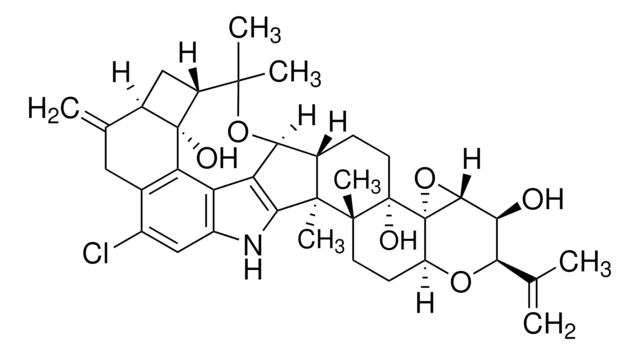SML0408
Carboxyamidotriazole
≥98% (HPLC)
Synonym(s):
5-Amino-1-[[3,5-Dichloro-4-(4-chlorobenzoyl)phenyl]meth yl]-1H-1,2,3-triazole-4-carboxamide, CAI, L-651582
About This Item
Recommended Products
Assay
≥98% (HPLC)
form
powder
color
white to beige
solubility
DMSO: 10 mg/mL (clear solution)
storage temp.
2-8°C
SMILES string
NC(=O)c1nnn(Cc2cc(Cl)c(c(Cl)c2)C(=O)c3ccc(Cl)cc3)c1N
InChI
1S/C17H12Cl3N5O2/c18-10-3-1-9(2-4-10)15(26)13-11(19)5-8(6-12(13)20)7-25-16(21)14(17(22)27)23-24-25/h1-6H,7,21H2,(H2,22,27)
InChI key
WNRZHQBJSXRYJK-UHFFFAOYSA-N
Biochem/physiol Actions
Signal Word
Danger
Hazard Statements
Precautionary Statements
Hazard Classifications
Acute Tox. 3 Oral
Storage Class Code
6.1C - Combustible acute toxic Cat.3 / toxic compounds or compounds which causing chronic effects
WGK
WGK 3
Flash Point(F)
Not applicable
Flash Point(C)
Not applicable
Regulatory Listings
Regulatory Listings are mainly provided for chemical products. Only limited information can be provided here for non-chemical products. No entry means none of the components are listed. It is the user’s obligation to ensure the safe and legal use of the product.
JAN Code
SML0408-VAR:
SML0408-BULK:
SML0408-5MG:
SML0408-25MG:
Certificates of Analysis (COA)
Search for Certificates of Analysis (COA) by entering the products Lot/Batch Number. Lot and Batch Numbers can be found on a product’s label following the words ‘Lot’ or ‘Batch’.
Already Own This Product?
Find documentation for the products that you have recently purchased in the Document Library.
Articles
We offers many products related to calcium channels for your research needs.
Our team of scientists has experience in all areas of research including Life Science, Material Science, Chemical Synthesis, Chromatography, Analytical and many others.
Contact Technical Service









